Suspiria Blu-ray Movie
HomeSuspiria Blu-ray Movie 
Blu-ray + Digital CopyLionsgate Films | 2018 | 152 min | Rated R | Jan 29, 2019
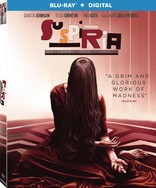
Movie rating
7.2 | / 10 |
Blu-ray rating
| Users | 4.5 | |
| Reviewer | 3.5 | |
| Overall | 3.5 |
Overview
Suspiria (2018)
A young ballet dancer travels to a prestigious dance academy in Berlin in 1977, only to discover it is a front for something far more sinister and supernatural amidst a series of increasingly grisly murders.
Starring: Chloë Grace Moretz, Tilda Swinton, Doris Hick, Malgorzata Bela, Fred KelemenDirector: Luca Guadagnino
| Horror | Uncertain |
| Mystery | Uncertain |
| Supernatural | Uncertain |
| Thriller | Uncertain |
| Period | Uncertain |
| Fantasy | Uncertain |
Specifications
Video
Video codec: MPEG-4 AVC
Video resolution: 1080p
Aspect ratio: 1.85:1
Original aspect ratio: 1.85:1
Audio
English: Dolby Atmos
English: Dolby TrueHD 7.1 (48kHz, 24-bit)
Subtitles
English SDH, Spanish
Discs
Blu-ray Disc
Single disc (1 BD)
Digital copy
Packaging
Slipcover in original pressing
Playback
Region A (locked)
Review
Rating summary
| Movie | 3.5 | |
| Video | 4.5 | |
| Audio | 5.0 | |
| Extras | 1.0 | |
| Overall | 3.5 |
Suspiria Blu-ray Movie Review
Dance with the devil.
Reviewed by Jeffrey Kauffman January 13, 2019It can be treacherous business to remake an iconic film about an apparently naive young woman getting swept into an overpowering conspiracy involving a coven of witches, as most who have seen the 2014 version of Rosemary's Baby may concur. As I mentioned in the Rosemary's Baby Blu-ray review, a certain unavoidable question often accrues when any remake shows up to revisit an earlier outing, namely: Why? Filmmakers had better have a darned good answer to that question, perhaps especially in cases of films that were lionized in their original versions. Why, indeed, tinker with success? What “new, improved” elements could possibly be added? Those “answers” were probably moot with regard to Rosemary’s Baby (the 2014 version, that is), since it was such a boneheaded, ham fisted attempt to reshape the legendary Ira Levin source novel. There’s something a bit more nuanced at play with regard to Luca Guadagnino’s reimagining of one of the more notorious horror films from Dario Argento’s long and noted career, 1977’s Suspiria. The problem (if indeed it’s even considered a problem) with this particular remake may not be in any brainlessness (as in the case of the Rosemary’s Baby remake debacle), but in fact in its sometimes overweening intellectualism, which takes the basic conceit of Argento’s film (spoiler coming for those who want to avert their eyes), a German dance academy run by a coven of witches, and ups the ante by introducing a whole host of sidebar issues.
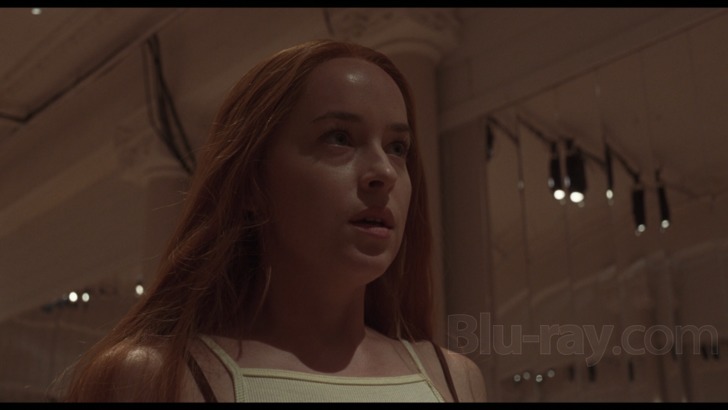
The remake more or less announces its blatant theatricality with a title card that describes the work as “six acts and an epilogue in a divided Berlin”. Already screenplay adapter David Kajganich and Guadagnino are bringing into play the fractious political environment in the bisected German city, and Germany as a whole, in 1977 (not so coincidentally the year of the original film’s debut, of course). The film begins with a couple of vignettes which are only tangentially related to elements in the original film. An obviously troubled young woman named Patricia Hingle (Chloë Grace Moretz) shows up at the home of her therapist, Dr. Josef Klemperer (“Lutz Ebersdorf” — see next paragraph, with the caveat that it contains another spoiler). Patricia is evidently in the throes of some sort of delusional manic episode, and only by piecing together a few clues doled out in fairly disjunctive and discursive dialogue does it become evident that Patricia has become convinced there is something evil at work at the dance academy where she’s a student.
(Note: “Lutz Ebersdorf” is in fact Tilda Swinton, in makeup that is never totally convincing. It may be a fatal error for some viewers at least that this artifice is offered up so early in the film, especially since Klemperer turns out to be a rather major character in this version, and everytime “he” appears, certain jaded types may be paying more attention to the latex and prosthetics than to the performance or plot points.)
The film also provides another early and in this case near hallucinatory vignette that shows a woman, evidently part of some kind of religious community, on her deathbed. Ultimately it is revealed that this is a Mennonite group and the dying woman is the mother of main character Susie Bannion (Dakota Johnson). While there’s really not a ton of information given throughout the film (which may beg the question as to why this particular element was even included), Susie has evidently escaped the clutches of this supposedly repressive group, and has traveled to West Berlin where she has arranged to audition at the Tanz Dance Academy. There are already a number of questions that some viewers may be listing, especially if they’re fans of the original film. Among these are how a coven so in control of its members (or initiates) would allow one of them to go to regular therapy sessions to discuss her fears, and another perhaps unanswered issue is how a Mennonite girl from Ohio ever developed “dance skills” impressive enough to get her an audition in West Berlin of all places.
All of that said, anyone who has seen the original Suspiria (which frankly had its own lapses in absolute logic) will know the broad general outlines of this version, though it’s in the additions and/or differences that this Suspiria really finds its most unique offerings, though those offerings may not be necessarily supportive of the main tale and therefore not to everyone’s liking. There’s a whole subtext of religious fervor running rampant through the film, not necessarily limited to your everyday Satanic dance aficionado, but there’s also a rather puzzling subplot involving the Holocaust, as personified by survivor Dr. Klemperer, who is still on the hunt for his missing wife who is presumed to have perished in the calamity (original star Jessica Harper shows up for a cameo as this character). There’s also more information given over to what Argento himself called “The Three Mothers”, but this aspect is presented in so opaque a fashion that it’s hard to really glean much meaning from it.
This film does have at least two really arresting set pieces, both of which may afflict those with more sensitive dispositions. A highlight of the film is an insane sequence that sees Susie basically dancing another student to death (unwittingly), as she contorts her body in a dance magically infused by the power of headmistress Madame Blanc (Tilda Swinton without prosthetics). Another sequence finds yet a third student experiencing a major injury but continuing to dance on under mind control. The film’s absolutely gonzo climax has a certain “reveal” that is nowhere to be found in Argento’s original, and which upon any serious examination may lead more analytical viewers into a whole slew of new questions about Susie and her past.
What's kind of interesting about this Suspiria is how it pretty much spills the beans about the coven aspect, as well as some of the "backstage" machinations between various power brokers among the adults, while also darting off into a number of other kind of odd tangents (I haven't even addressed a major through line, a series of terrorist incidents afflicting Berlin). Some of these additions may well strike some fans of the original as either completely needless or at best insufficiently developed and/or woven into the main tale. Still, this film is a riot of ideas and is certainly as stylish in its own (rather different) way as was Argento's original. It may not be a perfect remake, but as those behind the 2014 Rosemary's Baby can probably attest, the devil is in the details.
Note: My colleague Brian Orndorf was considerably less impressed by Suspiria than I was. You can read Brian's thoughts here.
Suspiria Blu-ray Movie, Video Quality 
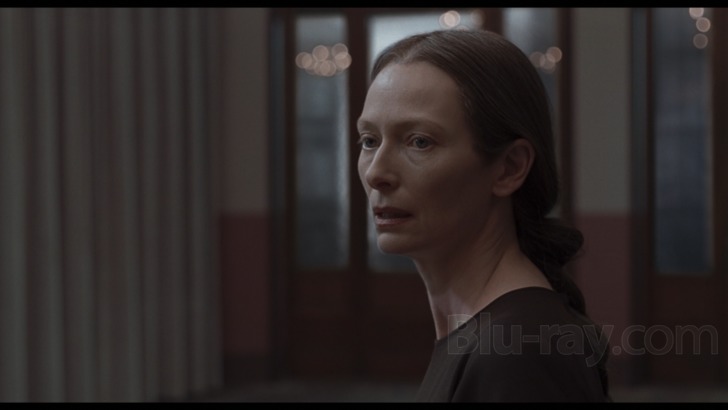
Suspiria is presented on Blu-ray courtesy of Lionsgate Films with an AVC encoded 1080p transfer in 1.85:1. Those acquainted with Argento's psychedically infused original may have to temper their expectations here, at least with regard to the palette, which is considerably dowdier than the 1977 version, emphasizing more neutral tones like beiges and browns a lot of the time. Still, this shot on film feature offers nice saturation levels and generally excellent detail levels, sometimes even in less than excellent lighting conditions. Guadagnino and cinematographer Sayombhu Mukdeeprom often favor extreme close-ups, albeit often from somewhat bizarre angles, something that supports commendable fine detail levels. There are just a couple of moments of minor banding (most noticeable behind some of the production mastheads, actually), but otherwise compression looks solid, delivering a nicely organic viewing experience.
Suspiria Blu-ray Movie, Audio Quality 
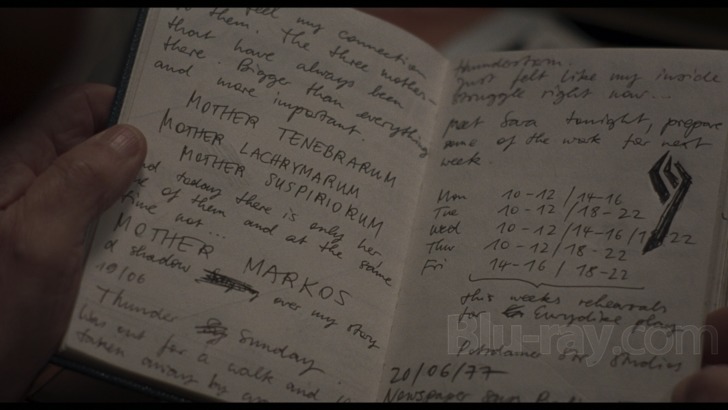
Suspiria's evocative, nightmarish sound design is one of its most notable achievements, and the Dolby Atmos track on this disc is a real knockout from a variety of standpoints. As is hinted at by the supposed meaning behind Mother Suspiriorum, namely "sighs", the film has a glut of "breathing" effects that are clearly situated in the Atmos channels and waft over the listener's head, sometimes in an almost menacing way (if breathing can be "menacing"). Also extremely effective is Thom Yorke's score, which includes everything from plaintive singer-songwriter material to more astringent atonal cues. The fact that there are often quite a few people in various sequences also provides excellent opportunity for both directional dialogue as well as good placement of background chatter and other effects. Fidelity is excellent throughout this problem free track.
Suspiria Blu-ray Movie, Special Features and Extras 
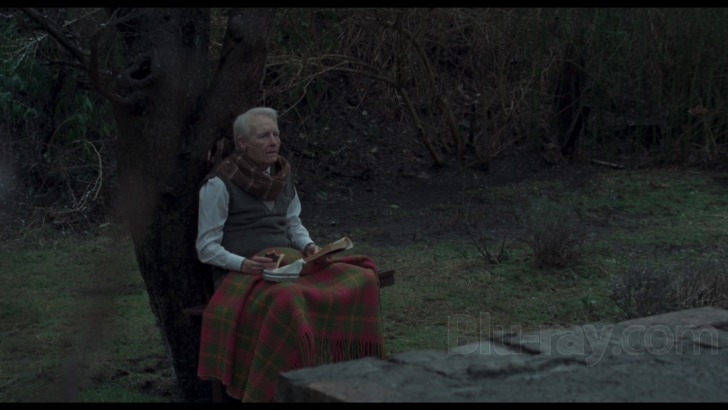
- The Making of Suspiria (1080p; 3:56) is the first of three relatively brief EPKs, all of which frankly could have been combined into one despite different ostensible focuses. This one is fairly general in nature, discussing Argento's original and the overall plot dynamics of this version.
- The Secret Language of Dance (1080p; 4:13) profiles choreographer Damien Jalet and this film's overt exploitation of the story's dance milieu that the original only hinted at.
- The Transformations of Suspiria (1080p; 4:27) is a fun piece that looks at some of the makeup and other special effects.
Suspiria Blu-ray Movie, Overall Score and Recommendation 
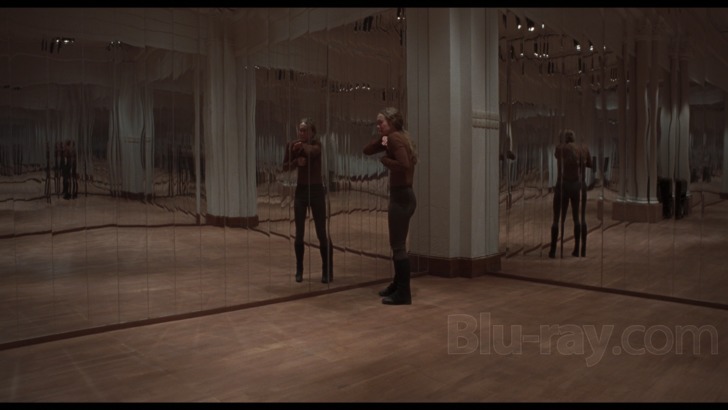
Suspiria is arguably both overlong and over convoluted, with too many "new, improved" elements added to Argento's original conception. But this is often a challenging new imagining of the basic storyline, one that I'm not sure consistently hits its supposed target, but which deserves kudos for at least trying something challenging. It's a stylistic tour de force in any case, and it features some great performances, though some churlish viewers may be distracted by some of the makeup on Swinton (who also appears as a third character). Technical merits are first rate, and at least for those with an open mind about sometimes questionable remakes, Suspiria comes Recommended.
Similar titles
Similar titles you might also like

Suspiria 4K
1977

The Witch 4K
2015

The Omen
1976

The Legacy
1978

The City of the Dead
Horror Hotel
1960

Dark August
1976

The Curse of la Llorona
2019

Gretel & Hansel 4K
2020

The Possession of Joel Delaney 4K
Slipcover in Original Pressing
1972

The Other Side of the Door
2016

My Bloody Valentine
Remastered
1981

The Conjuring 4K
2013

Salem's Lot
1979

Season of the Witch
1972

It Follows
2014

Sleepy Hollow
1999

Valentine
Collector's Edition
2001

Eyes of Laura Mars
1978

The Prowler
Rosemary's Killer
1981

Mandy
2018
